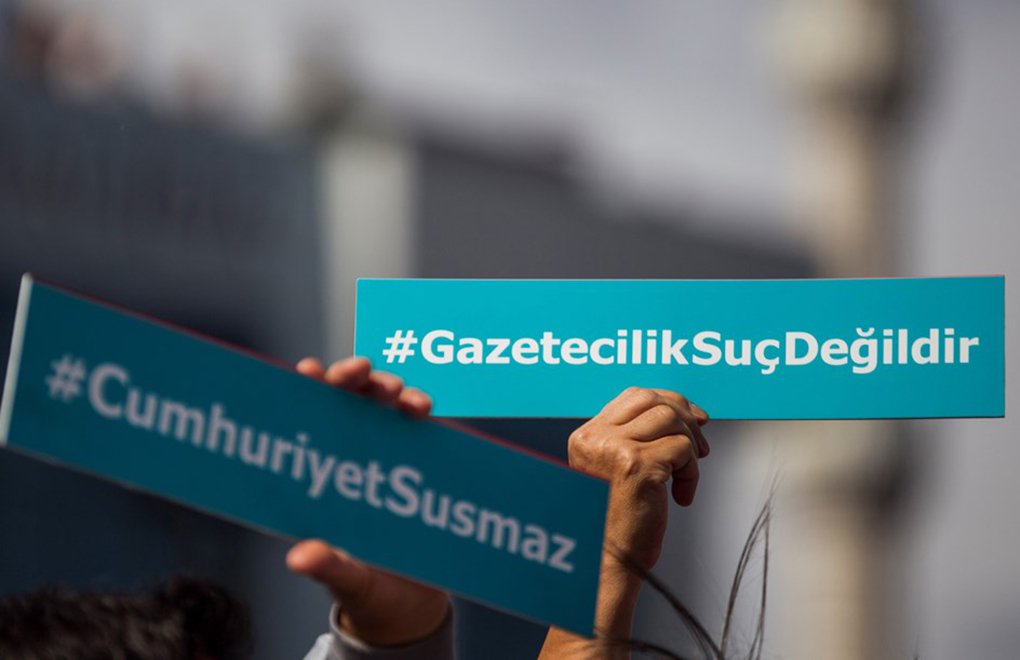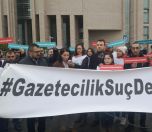* Photo: Twitter - "Journalism is not a crime"
Click to read the article in Turkish
Press in Arrest has released its "7-Month Press Freedom Report" documenting the legal proceedings and trials of journalists in Turkey.
Referring to the judiciary recess that has started in the country and will end in September, the report has said, "Thus, after the rather turbulent first seven months of 2020, trials were given a short break. This in turn gave us the opportunity to evaluate this period.
Covering the period from January 2020 to July 2020, the Press in Arrest report has reminded the public that at least 65 journalists were behind bars in Turkey during Eid al-Adha in late July.
"2020 continues as a year when the world as we know it has been shocked to its core. The world is like a ship that has lost its bearings," the report has said and added: "Naturally, in a country such as Turkey, where one may talk about only an arbitrary democracy, the impact of these shocks is much more devastating, even lethal. The past seven months witnessed developments that eclipsed even the most dramatic TV series."
According to the report, Turkey's 7-month agenda of freedom of expression was marked by "law of multiple bars," "social media law" and "amnesty law" brought up by the Nationalist Movement Party (MHP).
The report has reiterated that "according to the World Press Freedom Index, whereby Reporters Without Borders (RSF) evaluate the situation of press freedom in 180 countries on an annual basis, Turkey rose to 154th spot."
However, the report has also reminded the public that, having ranked 157th in the previous two years, "Turkey's progress in the index may be explained by the worsening of the situation in other countries, and the 1. Judiciary Package launched at the end of 2019."
Noting that "coronavirus pandemic which shook the entire world had a serious impact on Turkey as well," the report has shared the following figures about the period of March 17 - June 15, when legal proceedings were suspended as part of pandemic measures in the country:
- At least 61 journalists were summoned to testify, taken into custody and faced criminal complaints. Lawsuits were filed against 18 journalists.
- In 59 press trials held in 9 provinces, 92 journalists faced prison sentences totaling 5 counts of aggravated life sentence, 1 count of life sentence and at least 587 years 3 months to 1513 years 15 days of imprisonment. All the hearings were postponed during this period.
According to the Press in Arrest database, in the first 7 months of 2020;
- At least 152 journalists stood trial in 89 cases in 11 cities.(These journalists appeared in court at least once in the first 7 months of 2020.)
- Of these 89 trials, 18 were concluded, while 71 continue.
- Of at least 152 journalists tried in the 89 cases,
- 8 were acquitted,
- 8 were sentenced to prison,
- 1 was sentenced to an administrative fine,
- 2 saw their cases dropped,
- 133 continue to stand trial.
Some details from the first seven months of 2020 are as follows:
MİT trials, Deniz Yücel, Aziz Oruç...
"For his news articles published on the German-based Die Welt newspaper, Deniz Yücel was prosecuted on charges of 'continuously spreading propaganda for a terror organization', facing a prison sentence between 3 years 6 months to 20 years 6 months. The trial has been concluded and Yücel is condemned to 2 years 9 months 22 days in prison for 'continuously spreading propaganda for a terror organization via the media'.
"For their news stories on the funeral of a National Intelligence Organization (MİT) officer killed during Turkish operations in Libya, a lawsuit was brought against journalists Barış Terkoğlu, Barış Pehlivan and Hülya Kılınç of Odatv, Ferhat Çelik and Aydın Keser of Yeni Yaşam newspaper, and Murat Ağırel of Yeniçağ newspaper, who were detained in March 2020.
"As such, under the scope of the 'MİT News Trial', 7 journalists started being tried for 'revealing information that must be kept confidential for the state's security and its domestic and external political interests' and 'breaching the MİT law', facing prison sentences between 8 to 19 years. The first hearing was held in June 2020, and Aydın Keser, Barış Terkoğlu and Ferhat Çelik were released. The court ordered the continuation of the imprisonment of Barış Pehlivan, Hülya Kılınç and Murat Ağırel.
"Journalist Müyesser Yıldız was detained on June 8th, 2020 with a police raid on her Ankara home. Alongside her, Tele1 TV's Ankara Representative İsmail Dükel was also detained under the same investigation. It was revealed that the investigation was on charges of 'political and military espionage'. Later on, Ankara Chief Public Prosecutor's Office, Terrorist Crimes Investigation Bureau changed the accusation and demanded Yıldız's arrest on charges of 'revealing information that must be kept confidential for the state's security and its domestic and external political interests'.
"Yıldız was arrested on June 12th, 2020 on this charge, for two of her news articles about Turkey's military operations in Libya. Müyesser Yıldız has been placed in Ankara Sincan Women's Closed Prison, however, the indictment against her has not been drafted yet.
"Journalist Aziz Oruç had gone abroad in 2017 due to the legal proceedings against him, resumed journalism in Northern Iraq, passed via Iran to Armenia in order to travel to Europe, however was deported to Turkey by Armenia, and was detained and arrested in Ağrı.
"In the indictment, the prosecutor based the accusations on the social media posts and likes of the TV channel he worked for, as well as his interviews, requesting a prison term between 9 years 4 months 15 days to 28 years 1 month 15 days. The first hearing was held in July 2020. Oruç remains in prison, and the trial will continue in September.
'More systematic pressure through BİK, RTÜK'
"Pressure is placed on the freedom of press and journalists not only via legislation and legal proceedings, but also by means of the Radio and Television Supreme Council (RTÜK) and Press Bulletin Authority (BİK) -thus at a bureaucratic level and in a more systematic way.
"RTÜK imposes TV channels penalties such as broadcast bans and heavy administrative fines, while BİK prevents certain newspapers from receiving ads, thus also placing economic pressure on dissident media outlets such as Fox TV, Tele 1 TV, Halk TV, BirGün newspaper, Evrensel newspaper, and Cumhuriyet newspaper. In brief, journalists working in these outlets are pressurized by the judiciary system, while the media outlets themselves are pressurized by the bureaucracy.
'At least 251 journalists standing trial'
"The judiciary recess has begun, however, according to the Press in Arrest database, as of today,
- At least 65 journalists are in prison as convicts or detainees.
- At least 251 journalists stand trial in or outside prison, or in absentia.
- At least 9 journalists were taken into custody, summoned to testify, faced a new investigation and / or criminal complaint.
These journalists were Sibel Hürtaş; Aytunç Erkin, a journalist with Sözcü newspaper; Yılmaz Özdil, a columnist with Sözcü newspaper; Artı Gerçek web site's columnist Nurcan Kaya; Mustafa Temiz, the concessionaire of the web site 'Manisa Son Haber'; Ayşe Güney, the spokeswoman of the Mesopotamia Women Journalists Platform and editor of the agency Jinnews; journalists Onur Emre Yağan, Emel Armutçu and Can Özçelik.
- Three journalists were acquitted, namely Doğan Akın, Onur Emre Yağan and Mehmet Yakup Yılmaz.
- Lawsuits were filed against four journalists, namely Rawin Sterk, Hazal Ocak, Olcay Büyüktaş Akça and Hakan Aygün.
- One journalists was sentenced to prison, namely Deniz Yücel.
(HA/SD)









